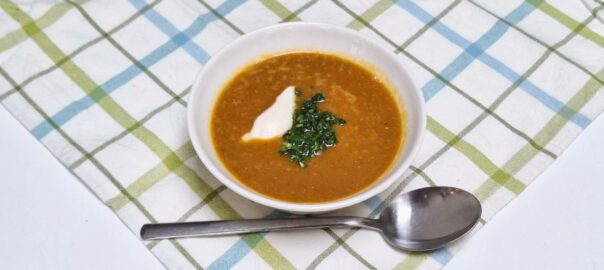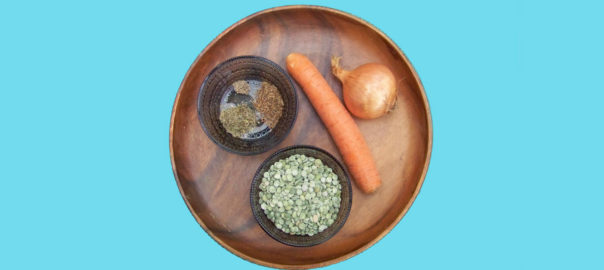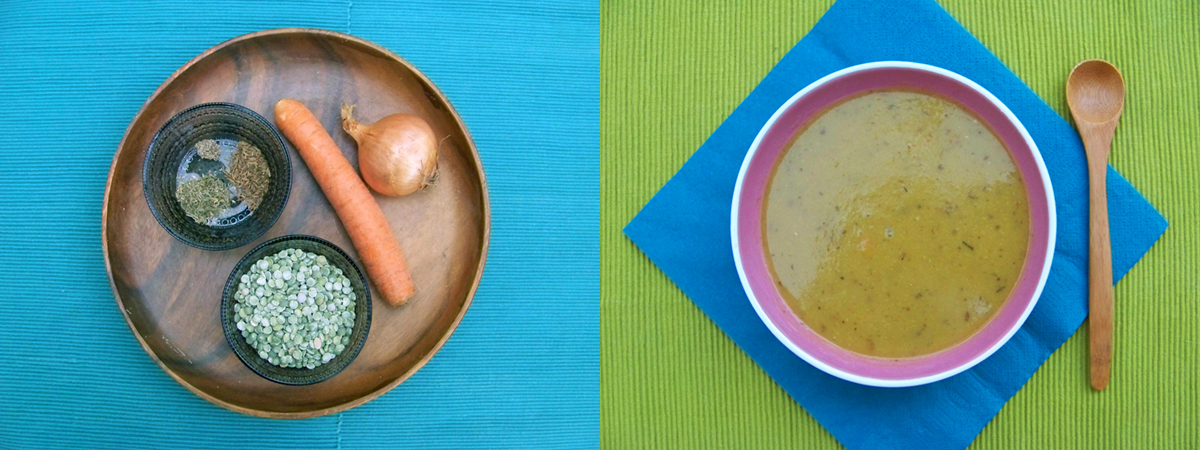Yoga Kitchen – Simple, healthy, plant-based
Go for lentils in your soup
Choosing plant-based food also offers opportunities to break away from the unhealthy traditions of our traditional, animal-based eating habits.
The main issue in switching from a classic omnivorous diet with (too much) meat, fish and dairy to a more or even completely plant-based diet is about a protein transition.
Animal proteins are replaced by plant-based proteins. This has health benefits, provided you do it properly and sensibly. If we all do this at the same time, the collective result, i.e. the sum of what we do as individuals, has immense benefits for the environment and saves a huge amount of animal suffering and animal lives.
New habits
It is often a challenge to make this transition. We are less familiar with plant-based protein sources. We have to learn new habits.
A good way to consume (more) plant-based proteins is by eating legumes. Legumes include all types of beans, peas and also the many types of lentils. A good way to eat lentils every week is by systematically incorporating them into soups. This is very easy to do. Of course, there are excellent recipes for lentil soups in all kinds of cookbooks, which you can follow to the letter and to the gram. With exactly the same vegetables and herbs as in the recipe.
However, you can also use a generic or general basic recipe for vegetable soup with lentils, in harmony with the fresh vegetables available each season.
What ingredients do you need for such a lentil and vegetable soup?
- 100 to 150 g dry lentils or approx. 180 to 200 g pre-cooked lentils from a jar or tin
- 1 litre vegetable stock, unsalted if possible
- approx. 250 g of the “star vegetable”, the main vegetable in your soup that will determine the flavour and colour
- one onion
- a carrot
- 1 sprig of green or white celery
- dried herbs of your choice
- black pepper
- 1 teaspoon extra sea salt (optional)
The star vegetable could be pumpkin, broccoli, fennel or celeriac, to name but a few.
The herbs could be cumin, thyme, oregano or fennel seeds.
As for the lentils, you can choose one of the many varieties available:
- blonde lentils
- brown lentils
- red coral lentils
- yellow lentils
- green lentils
- etc.
Preparation method
- If necessary, soak the dry lentils in plenty of water for a few hours, then drain the soaking water and rinse the lentils.
- Chop the onion, peeled carrot, celery and star vegetable into pieces.
- Pour a little stock into a large saucepan and place over the heat.
- Sprinkle the herbs into the stock and bring to the boil.
- Add the chopped onion to the herbs in the stock and heat until it becomes slightly translucent.
- Pour the drained lentils into the pan and stir in with the onion and herbs.
- Then add the chopped carrot, celery and the remaining vegetables. Stir well.
- Finally, pour the rest of the vegetable stock over it.
- Bring to the boil again with the lid on the pan and cook for 20 to 25 minutes until done.
- Finally, blend the soup with a hand blender or in a blender.
- And at the end, add black pepper and salt to taste.
It is in the interest of your health to keep your salt intake on the low side.
And you’re done!
Serving tip: When serving, sprinkle some finely chopped fresh seasonal herbs over the soup. This adds extra flavour and nutritional value. Think of parsley, coriander, chives, spring onions, dill, etc.
How can I save energy when cooking?
You can cook the soup in a traditional saucepan with a lid. You can also use a pressure cooker, which halves the cooking time. A pressure cooker is much more economical to use. It is well worth the investment if you often eat beans and chick peas and want to cook them yourself.
In both cases, you can transfer the hot pan to a so-called “hay box” (also known as a “hay madam”) and leave it to cook further in a well-insulated environment without using any more gas or electricity. A modern hay box is no longer filled with hay or straw, but with old blankets or an old duvet. This insulates the pan, keeping it hot for hours and allowing your dish to cook slowly but surely.
Balance and variety
Legumes are good meat substitutes. An interesting fact is that their amino acid profile is not the same as that of animal products. Their relative low amount of the the amino acid methionine is automatically compensated for by simply eating cereal products. Cereal grains are very rich in methionine. Legumes and cereals therefore complement each other perfectly. And you don’t have to eat them together in the same meal. Think, for example, of a slice of wholemeal bread or a cereal cracker to eat with this soup. If you eat a varied plant-based diet, you don’t even need to pay attention to this issue.
How much protein do lentils contain?
Lentils contain a considerable amount of plant-based protein: about 23 g per 100 g of dry seeds. But of course, you don’t eat those seeds dry. Cooked lentils still contain 9 to 10 g of protein per 100 g of ready-to-use product.
They are also rich in minerals and contain a considerable amount of vitamins.
Participate in our cooking classes:
Read more about plant-based nutrition and health:
Read more about plant-based food
Find out about yoga and yoga classes in Schaerbeek:
Check out our yoga classes here:




